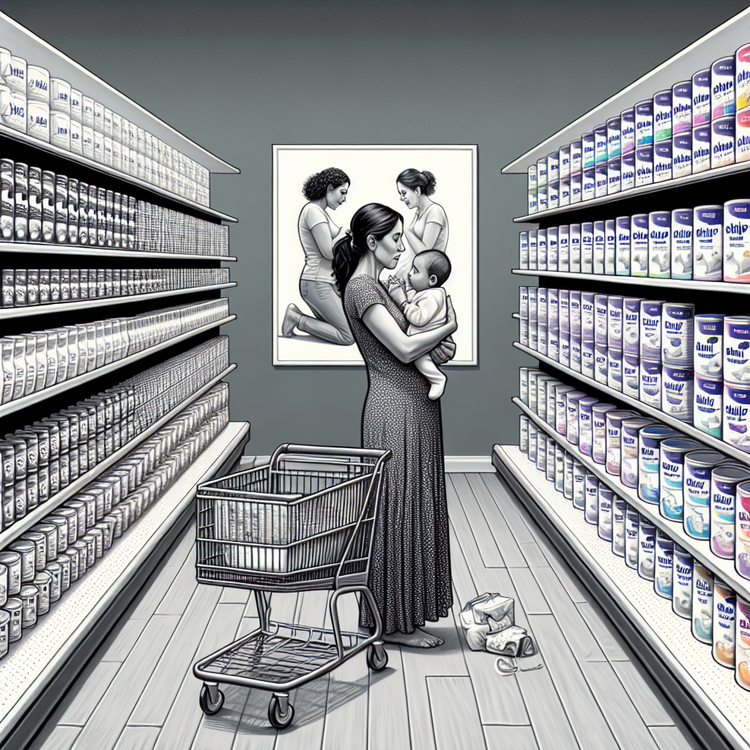The price of baby formula has been going up, making it hard for parents to afford it. Emma Davies, a single mom, finds it difficult to buy formula for her 13-week-old baby. Even though it’s expensive, she doesn’t want to buy cheaper options because she wants the best for her child. Other parents feel the same way and are willing to make sacrifices to make sure their kids have enough to eat. The Competition and Markets Authority (CMA) says that formula prices have gone up by 25% in the last two years, which means the companies that make formula are making a lot of money.
There are two big companies that dominate the baby formula market: Danone, which owns Aptamil and Cow & Gate, and Nestle, which owns SMA and Little Steps. These companies control 85% of the market, so it’s hard to find other brands. The CMA says that parents could save £500 in the first year of their baby’s life by trying different options. But some parents worry that cheaper brands might not be as good for their babies. Professor Amy Brown, who knows a lot about babies’ health, says that all infant formulas have to follow strict rules to make sure they have the right nutrients.
Some parents might not want to switch to cheaper brands because they think that higher prices mean better quality. But that’s not always true. In the UK, it’s against the law to advertise formula for babies under six months old, because they want to encourage breastfeeding. Stores also can’t promote special deals on formula, but they can do it for formula for older babies. Some supermarkets, like Iceland, want the rules to change so that parents have more choices and don’t have to spend so much money.
There aren’t many store brands of formula available right now, which makes the problem worse. The only supermarket that has its own brand of formula is Aldi, and it’s called Mamia. People who want to help families are asking other stores to do the same thing and make cheaper options. The cost of formula, along with other things like bills and rent, is putting a lot of pressure on families. Sophie Livingstone, who runs a charity called Little Village HQ, says that families are having a hard time and have to make tough choices, like watering down formula or using fewer diapers, because they don’t have enough money.
The CMA is looking into the baby formula market and will give an update in the middle of 2024. More and more families are asking for help from charities like Little Village HQ, which shows that things are getting harder for them. The cost of living keeps going up, which makes it even more difficult for parents to take care of their kids.
Original news source: Baby formula soaring costs: ‘I struggle, but I won’t buy a cheaper brand’ (BBC)
Listen:
Slow
Normal
Fast
Vocabulary:
| 1 | formula | A special type of food for babies |
| 2 | afford | To have enough money to buy something |
| 3 | sacrifices | Giving up something important for a greater cause |
| 4 | dominate | To have control or power over something |
| 5 | brands | Different types or kinds of products |
| 6 | nutrients | Substances that are necessary for growth and health |
| 7 | advertise | To make something known to the public in order to sell it |
| 8 | promote | To encourage or support the use or purchase of something |
| 9 | available | Able to be obtained or used |
| 10 | pressure | The feeling of stress or strain caused by problems or demands |
| 11 | update | The latest information or news about something |
| 12 | charities | Organizations that help people in need |
| 13 | middle | The middle part or point of something |
| 14 | difficult | Not easy or simple |
| 15 | take care of | To provide the necessary things for someone or something |
Group or Classroom Activities
Warm-up Activities:
– News Summary
Instructions: Divide the class into pairs or small groups. Give each group a few minutes to read the article. Then, ask each group to summarize the main points of the article in their own words. Afterward, have each group share their summaries with the class.
– Opinion Poll
Instructions: Write the following question on the board: “Do you think parents should switch to cheaper brands of baby formula to save money?” Have the students individually write down their answer and a brief explanation. Then, divide the class into small groups and have them discuss their opinions and reasons. Finally, have a class discussion where students share their opinions and try to reach a consensus.
– Vocabulary Pictionary
Instructions: Write a list of vocabulary words from the article on the board (e.g. formula, dominate, nutrients, advertise, charity). Divide the class into teams. One student from each team comes to the board and chooses a word. They must then draw a picture to represent the word, while their team tries to guess the word. The team with the most correct guesses wins.
– Speed Summarizing
Instructions: Divide the class into pairs. Give each pair a set amount of time (e.g. 1 minute) to summarize the article to their partner. After the time is up, have the pairs switch roles and summarize again. Repeat this process several times, gradually reducing the amount of time given. This activity helps students practice summarizing skills and improves fluency.
– Future Predictions
Instructions: In small groups, have the students discuss and make predictions about the future of the baby formula market. For example, will prices continue to rise? Will more store brands be introduced? Will the CMA make any significant changes? Each group should discuss their predictions and provide reasons to support them. Afterward, have a class discussion where groups share their predictions and discuss the likelihood of each one.
Comprehension Questions:
1. Why is it becoming difficult for parents to afford baby formula?
2. Why does Emma Davies, a single mom, find it hard to buy formula for her baby?
3. What percentage of the baby formula market do Danone and Nestle control?
4. How much money could parents potentially save in the first year of their baby’s life by trying different formula options?
5. Why do some parents worry about switching to cheaper formula brands?
6. What rules are in place in the UK regarding the advertising and promotion of formula for babies under six months old?
7. Why do some supermarkets, like Iceland, want the rules to change regarding formula advertising and promotion?
8. Why are families having to make tough choices like watering down formula or using fewer diapers?
Go to answers ⇩
Listen and Fill in the Gaps:
The price of baby formula has been going up, making it hard for parents to (1)______ it. Emma Davies, a single mom, finds it difficult to buy formula for her 13-week-old baby. Even though it’s expensive, she doesn’t want to buy cheaper options because she wants the best for her (2)______. (3)______ parents feel the same way and are willing to make sacrifices to make sure their kids have enough to eat. The Competition and Markets Authority (CMA) says that formula prices have gone up by 25% in the last two (4)______, which means the companies that make formula are making a lot of money.
There are two big companies that dominate the baby formula market: Danone, which owns Aptamil and Cow & Gate, and Nestle, which owns SMA and Little Steps. These companies control 85% of the market, so it’s hard to find other brands. The CMA says that (5)______ could save £500 in the first year of their baby’s life by trying different options. But some parents worry that cheaper brands might not be as good for their babies. Professor Amy Brown, who knows a lot about babies’ health, says that all infant formulas have to follow (6)______ rules to make sure they have the right nutrients.
Some parents might not want to (7)______ to cheaper brands because they think that (8)______ prices mean better quality. But that’s not always true. In the UK, it’s against the law to (9)______ formula for babies under six months old, because they want to encourage (10)______. (11)______ also can’t promote special deals on formula, but they can do it for formula for older babies. Some supermarkets, like Iceland, want the rules to change so that parents have more choices and don’t have to spend so much money.
There aren’t many store brands of formula available right now, which makes the problem worse. The only supermarket that has its own brand of formula is Aldi, and it’s called Mamia. People who want to help families are asking other stores to do the same (12)______ and make cheaper options. The cost of formula, along with other things like bills and rent, is putting a lot of pressure on families. Sophie Livingstone, who runs a (13)______ called Little Village HQ, says that families are having a hard time and have to make tough choices, like (14)______ down formula or using fewer diapers, because they don’t have enough money.
The CMA is looking into the baby formula market and will give an (15)______ in the middle of 2024. More and more families are asking for help from (16)______ like Little Village HQ, which shows that things are getting harder for them. The cost of living keeps going up, which makes it even more difficult for parents to take care of their kids.
Go to answers ⇩
Discussion Questions:
Students can ask a partner these questions, or discuss them as a group.
1. What is baby formula and why do parents use it?
2. How would you feel if you couldn’t afford to buy formula for your baby?
3. Do you think it’s important for parents to buy the most expensive formula for their babies? Why or why not?
4. What are some sacrifices that parents might have to make to ensure their kids have enough to eat?
5. What do you think about the fact that formula prices have gone up by 25% in the last two years?
6. Do you think it’s fair that only two big companies dominate the baby formula market? Why or why not?
7. Why do you think some parents are hesitant to switch to cheaper brands of formula?
8. Do you think higher prices always mean better quality? Why or why not?
9. What do you think about the law in the UK that prohibits advertising formula for babies under six months old?
10. Should supermarkets be allowed to promote special deals on formula for babies? Why or why not?
11. Why do you think there aren’t many store brands of formula available right now?
12. Do you think other supermarkets should follow Aldi’s example and create their own brand of formula? Why or why not?
13. How do you think the cost of formula, along with other expenses, affects families?
14. What do you think the CMA should do to address the issues in the baby formula market?
15. How do you think the rising cost of living affects parents’ ability to take care of their kids?
Individual Activities
Vocabulary Meanings:
Match each word to its meaning.
Words:
1. formula
2. afford
3. sacrifices
4. dominate
5. brands
6. nutrients
7. advertise
8. promote
9. available
10. pressure
11. update
12. charities
13. middle
14. difficult
15. take care of
Meanings:
(A) To have control or power over something
(B) Substances that are necessary for growth and health
(C) To encourage or support the use or purchase of something
(D) A special type of food for babies
(E) To provide the necessary things for someone or something
(F) Organizations that help people in need
(G) Giving up something important for a greater cause
(H) Different types or kinds of products
(I) The latest information or news about something
(J) To make something known to the public in order to sell it
(K) Not easy or simple
(L) To have enough money to buy something
(M) The feeling of stress or strain caused by problems or demands
(N) Able to be obtained or used
(O) The middle part or point of something
Go to answers ⇩
Multiple Choice Questions:
1. Why are some parents finding it difficult to afford baby formula?
(a) Baby formula is not available in stores.
(b) Parents are not willing to make sacrifices.
(c) The price of baby formula has been going up.
(d) The Competition and Markets Authority (CMA) has banned the sale of baby formula.
2. Which two companies dominate the baby formula market?
(a) Aptamil and SMA
(b) Cow & Gate and Little Steps
(c) Iceland and Aldi
(d) Danone and Nestle
3. According to the CMA, how much have formula prices increased in the last two years?
(a) 25%
(b) 50%
(c) 10%
(d) 75%
4. Why do some parents hesitate to switch to cheaper brands of formula?
(a) Cheaper brands are not available in stores.
(b) Cheaper brands do not follow strict nutrient rules.
(c) Cheaper brands are not advertised.
(d) They believe higher prices mean better quality.
5. Why is it against the law to advertise formula for babies under six months old in the UK?
(a) To promote cheaper formula options
(b) To increase competition among formula companies
(c) To encourage breastfeeding
(d) To protect the interests of supermarkets
6. Which supermarket currently has its own brand of formula?
(a) Iceland
(b) Aldi
(c) Little Village HQ
(d) Mamia
7. What tough choices are some families making due to the high cost of formula?
(a) Buying more expensive formula options
(b) Watering down formula or using fewer diapers
(c) Seeking help from charities
(d) Moving to a different country
8. When will the CMA provide an update on the baby formula market?
(a) In the middle of 2024
(b) In the middle of 2022
(c) In the middle of 2020
(d) In the middle of 2026
Go to answers ⇩
True or False Questions:
1. The CMA suggests that parents could save £500 in their baby’s first year by exploring alternative formula options.
2. The UK prohibits advertising formula for babies under six months old to promote breastfeeding, and stores cannot promote special deals on formula, although they can for formula intended for older babies.
3. A single mom named Emma Davies easily buys formula for her 13-week-old baby due to its low cost.
4. The baby formula market is dominated by many companies, and no single company controls a majority of the market share.
5. The price of baby formula has been increasing, making it challenging for parents to afford it.
6. The Competition and Markets Authority (CMA) reports a 25% increase in formula prices over the past two years, indicating significant profits for formula companies.
7. Some parents are eager to switch to cheaper brands due to concerns about their quality, but not all infant formulas must adhere to strict regulations regarding nutrient content.
8. Despite the affordability, Emma prefers not to purchase cheaper options because she wants the best for her child.
Go to answers ⇩
Write a Summary:
Write a summary of this news article in two sentences.
Check your writing now with the best free AI for English writing!
Writing Questions:
Answer the following questions. Write as much as you can for each answer.
Check your answers with our free English writing assistant!
1. Why is it becoming difficult for parents to afford baby formula?
2. Why are some parents hesitant to buy cheaper brands of formula?
3. Who are the two main companies that dominate the baby formula market?
4. What does Professor Amy Brown say about the quality of different formula brands?
5. Why are some supermarkets and charities advocating for more affordable formula options?
Answers
Comprehension Question Answers:
1. Why is it becoming difficult for parents to afford baby formula?
– The price of baby formula has been going up, making it hard for parents to afford it.
2. Why does Emma Davies, a single mom, find it hard to buy formula for her baby?
– Emma Davies finds it difficult to buy formula for her baby because it is expensive and she wants the best for her child, so she doesn’t want to buy cheaper options.
3. What percentage of the baby formula market do Danone and Nestle control?
– Danone and Nestle control 85% of the baby formula market.
4. How much money could parents potentially save in the first year of their baby’s life by trying different formula options?
– Parents could potentially save £500 in the first year of their baby’s life by trying different formula options.
5. Why do some parents worry about switching to cheaper formula brands?
– Some parents worry that cheaper formula brands might not be as good for their babies.
6. What rules are in place in the UK regarding the advertising and promotion of formula for babies under six months old?
– In the UK, it is against the law to advertise formula for babies under six months old. Stores also cannot promote special deals on formula for babies under six months old.
7. Why do some supermarkets, like Iceland, want the rules to change regarding formula advertising and promotion?
– Some supermarkets, like Iceland, want the rules to change so that parents have more choices and don’t have to spend so much money.
8. Why are families having to make tough choices like watering down formula or using fewer diapers?
– Families are having to make tough choices like watering down formula or using fewer diapers because they don’t have enough money to cover the cost of formula, along with other expenses like bills and rent.
Go back to questions ⇧
Listen and Fill in the Gaps Answers:
(1) afford
(2) child
(3) Other
(4) years
(5) parents
(6) strict
(7) switch
(8) higher
(9) advertise
(10) breastfeeding
(11) Stores
(12) thing
(13) charity
(14) watering
(15) update
(16) charities
Go back to questions ⇧
Vocabulary Meanings Answers:
1. formula
Answer: (D) A special type of food for babies
2. afford
Answer: (L) To have enough money to buy something
3. sacrifices
Answer: (G) Giving up something important for a greater cause
4. dominate
Answer: (A) To have control or power over something
5. brands
Answer: (H) Different types or kinds of products
6. nutrients
Answer: (B) Substances that are necessary for growth and health
7. advertise
Answer: (J) To make something known to the public in order to sell it
8. promote
Answer: (C) To encourage or support the use or purchase of something
9. available
Answer: (N) Able to be obtained or used
10. pressure
Answer: (M) The feeling of stress or strain caused by problems or demands
11. update
Answer: (I) The latest information or news about something
12. charities
Answer: (F) Organizations that help people in need
13. middle
Answer: (O) The middle part or point of something
14. difficult
Answer: (K) Not easy or simple
15. take care of
Answer: (E) To provide the necessary things for someone or something
Go back to questions ⇧
Multiple Choice Answers:
1. Why are some parents finding it difficult to afford baby formula?
Answer: (c) The price of baby formula has been going up.
2. Which two companies dominate the baby formula market?
Answer: (d) Danone and Nestle
3. According to the CMA, how much have formula prices increased in the last two years?
Answer: (a) 25%
4. Why do some parents hesitate to switch to cheaper brands of formula?
Answer: (d) They believe higher prices mean better quality.
5. Why is it against the law to advertise formula for babies under six months old in the UK?
Answer: (c) To encourage breastfeeding
6. Which supermarket currently has its own brand of formula?
Answer: (b) Aldi
7. What tough choices are some families making due to the high cost of formula?
Answer: (b) Watering down formula or using fewer diapers
8. When will the CMA provide an update on the baby formula market?
Answer: (a) In the middle of 2024
Go back to questions ⇧
True or False Answers:
1. The CMA suggests that parents could save £500 in their baby’s first year by exploring alternative formula options. (Answer: True)
2. The UK prohibits advertising formula for babies under six months old to promote breastfeeding, and stores cannot promote special deals on formula, although they can for formula intended for older babies. (Answer: True)
3. A single mom named Emma Davies easily buys formula for her 13-week-old baby due to its low cost. (Answer: False)
4. The baby formula market is dominated by many companies, and no single company controls a majority of the market share. (Answer: False)
5. The price of baby formula has been increasing, making it challenging for parents to afford it. (Answer: True)
6. The Competition and Markets Authority (CMA) reports a 25% increase in formula prices over the past two years, indicating significant profits for formula companies. (Answer: True)
7. Some parents are eager to switch to cheaper brands due to concerns about their quality, but not all infant formulas must adhere to strict regulations regarding nutrient content. (Answer: False)
8. Despite the affordability, Emma prefers not to purchase cheaper options because she wants the best for her child. (Answer: False)
Go back to questions ⇧















